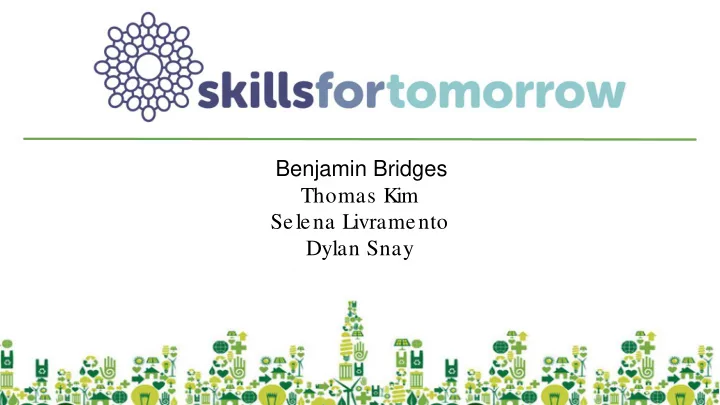

Benjamin Bridges Thomas Kim Selena Livramento Dylan Snay
Who we are Who we are ● 3rd year students ○ Connecticut and Massachusetts ● Benjamin Bridges ○ Biomedical Engineering with Biology Minor ● Thomas Kim ○ Robotics Engineering and Mechanical Engineering with a concentration in Manufacturing ● Selena Livramento ○ Management Engineering with a concentration in Operations Management ● Dylan Snay ○ Electrical and Computer Engineering
Our Project Our Project ● Focus: Focus: ○ Promote sustainable practices ○ Sustainability through geography ○ Prepare students for GCSEs ● Target audience: Target audience: secondary school students ● Location: Location: Hereford, UK ● Responsibilities: Responsibilities: ○ Opening speaker, workshop facilitators, evaluations
Background Background
Defining Sustainability Defining Sustainability ● Wide Scope ● Social impact ● Sustainable development ○ “Simply stated, the principle recognises the importance of ensuring that all people should be able to satisfy their basic needs and enjoy a better quality of life, both now and in the future” (UK Parliament, 201 1 )
Sustainability Education Sustainability Education ● The NHS Survey ○ 96% care about sustainability efforts ○ 25% think it’s a top priority ● Sustainability in Education ○ Not required ○ Taught by geography teachers ○ GCSE exam on geography
Methods Methods
Objectives & Methodologies Objectives & Methodologies ● Objective Objective 1: Efficiently connect logistics to the primary objective of the conference to ensure a cohesive event ○ Methods Methods: brainstorming ● Objective Objective 2: Develop an approach for contacting appropriate organizations to facilitate beneficial workshops ○ Methods Methods: checklists, unstandardized interviews
Objectives & Methodologies Objectives & Methodologies ● Objective Objective 3: Produce a conference that engages the students and increases their awareness of sustainable practices ○ Methods Methods: focus groups, unstandardized interviews ● Objective Objective 4: Evaluate the conference’s impact on the attending students and develop suggestions for future events ○ Methods Methods: surveys, participant observation, field notes
Organization Organization
Results Results
Formulation of Formulation of Pre Pre-Conference Materials Conference Materials ● Flyer provided to invited schools
Formulation of Pre Formulation of Pre - Conference Materials Conference Materials ● Color coded groups
Formulation of Pre Formulation of Pre -Conference Materials Conference Materials
Formulation of Pre Formulation of Pre -Conference Materials Conference Materials
Focus Group Focus Group
General Overview General Overview ● Overall positive feedback Overall positive feedback ○ Games and activities engaging ○ Efficacious videos and presentations ○ Less interest in lectures ● WooBikes was incredibly successful WooBikes was incredibly successful ○ Two e-bikes available ● Unlocking the Severn Unlocking the Severn ○ Desired data gleaned
Sustainable Cities Sustainable Cities Pupils had to design their own sustainable city on a budget while reacting to “News Flashes” such as a flood or overflowing landfill ● Positives Positives ○ News Flashes ○ Collaboration ● Negatives Negatives ○ Desire for more News Flashes
Geographic Information Systems Geographic Information Systems Pupils were shown practical applications of cartographic knowledge and geographic information systems (GIS) ● Positives Positives ○ Group work ○ Overall very informative ● Negatives Negatives ○ Too much lecturing ○ Computers were distracting ○ Least popular workshop
Food Security Food Security Pupils were given a brief overview of the definition of food security then participated in a “farming strategy” activity ● Positives Positives ○ Farming strategy game ○ Well-made presentation ○ Based on Oxford research ● Negatives Negatives ○ One long activity
Survey Statistics Survey Statistics ● 72 pupils in attendance ● 288 surveys given out ● 282 responses ○ 98% response rate
Idea Tree Idea Tree Pupils were asked at the beginning and end of the conference to write what sustainability meant to them. ● Positives: Positives: ○ Engaged the pupils ○ Reduced downtime ● Negatives: Negatives: ○ Unreliability ○ Definition of sustainability ○ Low response rate
Idea Tree Idea Tree ● Opening ○ 80% response rate ● Closing ○ 90% response rate ○ Lower number because some pupils left early
WooBikes and Unlocking the Severn WooBikes and Unlocking the Severn ● 39 WooBikes riders ○ (54% of attendees) ● 35 participants in Unlocking the Severn activity ○ (48% of attendees)
Conclusion Conclusion Overall: Overall: ● Positive results overall ○ Responses lacked depth ● Popular bonus activities ● Workshop popularity: 1 . Sustainable Cities 2. Food Security 3. Geographical Information Systems
Recommendations Recommendations What was your greatest takeaway from this workshop? ● Increased instruction on surveys (Example template) ○ Increased question structure ○ I learned that _______________ impacts Reverse scale __________ during the Sustainable Cities ○ Sentence template workshop
Recommendations Recommendations ● Activity-centered workshops ○ Avoidance of lecture-style ○ Multiple shorter activities ○ Audience participation
Recommendations Recommendations ● Re-confirming logistical information ○ Student roster ○ Room availabilities ○ Retrieving print materials
Recommendations Recommendations ● Better-suited classrooms ○ Distractions ○ Pre-event setup
Acknowledgements Acknowledgements ● United Purpose (Food Security facilitators) ● Ordnance Survey (GIS facilitator) ● University of Worcester Student Teachers (Sustainable Cities facilitators) ● Elena Lengthorn (Sponsor) ● Katy Boom (Opening Speaker) ● Sarah Williams (Hereford Academy contact) ● Dan Webb (Earl Mortimer contact) ● James Hanlan (WPI Advisor)
Questions? Questions?
Recommend
More recommend